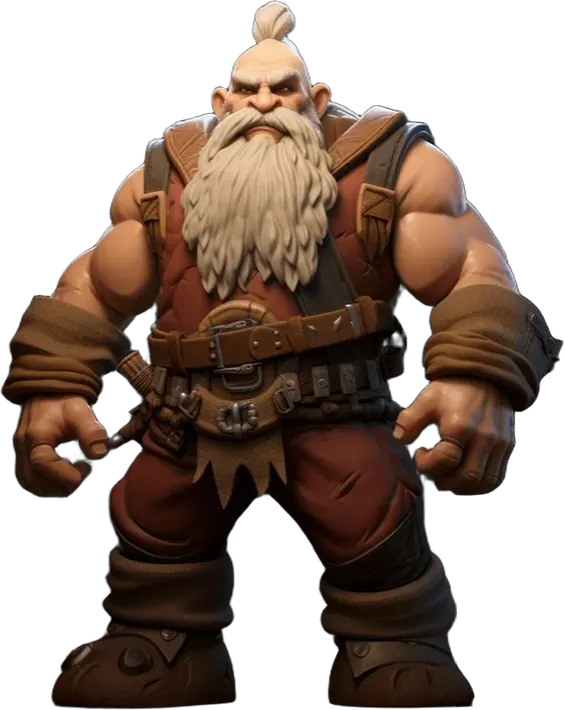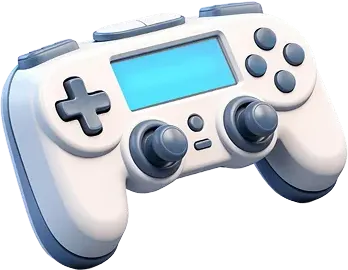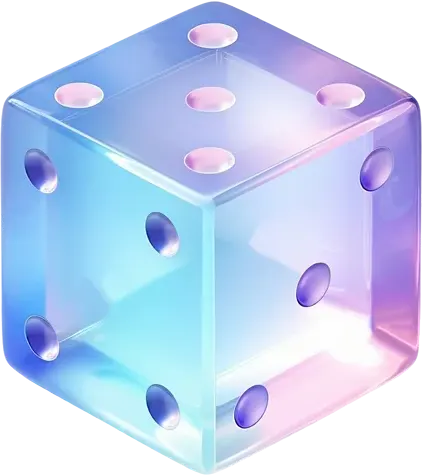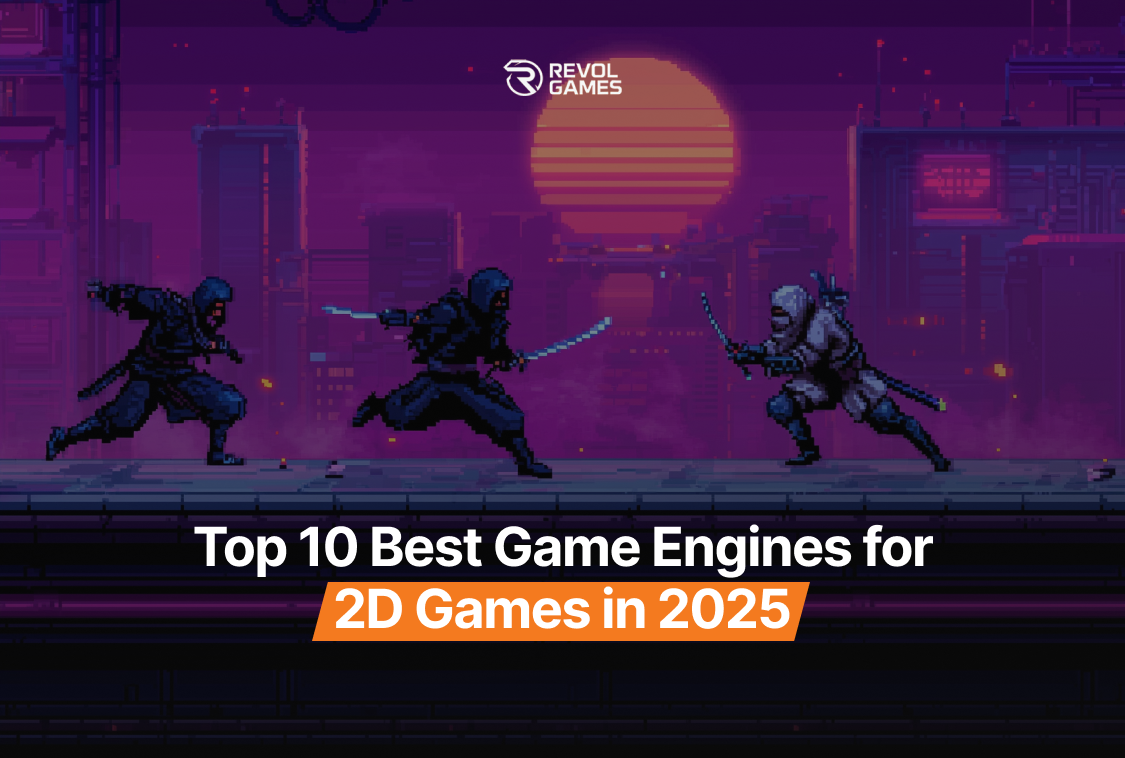
Have you ever wondered why 2D games are still a major success by playing a major role even against graphics? Well, 2D games are the most thrilling domains of the digital era, not because of storytelling, but the solo devs building retro pixel art gems to major studios while crafting a cross-platform gaming engine.
Getting the right engine for 2D games will be the success or failure of a struggling prototype and a refined, market-ready release.
Developers in 2025 have access to a gigantic canvas of mighty game engines for 2D games, each boasting its own unique strengths. Some are simple to design using visual scripting and drag-and-drop support, and others offer maximum coding flexibility to those who desire ultimate control.
What they all have in common is that they are all within financial reach, run smoothly, and offer maximum creative freedom.
Partnering with the right 2D game engine is not an easy task. It’s about building your goals and vision with skill set and platform ops. No matter what game you are trying to develop, the right software choice can bring your engine to a whole other level.
In this guide, I will explain to you how these top game engines for 2D games in 2025 can be a life changer for your brand.
What is a Game Engine?
A game engine refers to the central system used by developers to create, test, and publish video games. A game engine offers core software like rendering subsystems, physics simulation, animation management, audio management, and asset management. To make it concise, a game engine is a simple platform where the game resides.
2D games are very reliable and easy for developers as they only need to worry about the engine to handle sprites, lighting, tile maps, or scripting. A successful 2D game has a powerful and scalable engine that brings your ideas to life by managing a balance between efficient coding and reliable product solutions.
As of today, 2D game engines have become a capable cross-platform software that allows you to install games on multiple devices, like mobile and desktop, with ease.
Ready to Bring Your 2D Game to Life with the Best Tools in 2025?
Collaborate with RevolGames to turn your 2D game vision into an engaging, high-performing experience players will love.
What Makes a Great 2D Game Engine in 2025?
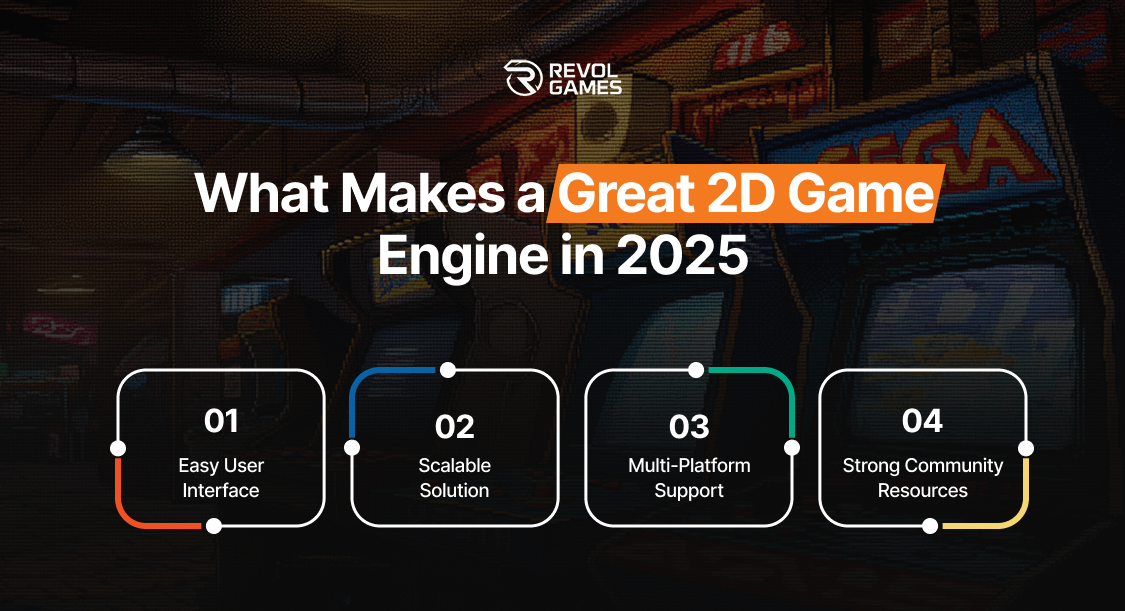
2D game developers in 2025 require a game engine that will do more than ever before. A reliable game engine should have a balance between performance and scalable power to allow developers to create successful ideas with ease. Moreover, we have explained the main features of the best game engines for 2D games that you must know:
- Easy User Interface: An easy-to-understand and attractive display allows designers to craft high-level animations for the users without dealing with in-depth coding.
- Scalable Solution: It all depends upon performance, as pipelines are fully optimized to offer gaming over different devices.
- Multi-Support System: With such an engine, the games are compatible on different platforms.
- Community and Documentation: Robust community and regularly updated tutorials guarantee short learning times.
- Scalability: From small indie titles to big productions, engines need to scale with added complexity.
- Licensing and Price: Inexpensive or free versions allow indies and newcomers to start more easily.
The top-quality game development software inherits such frameworks and tools to help developers design amazing and engaging games without losing any functionality.
What are the 10 Best Game Engines for 2D Games?
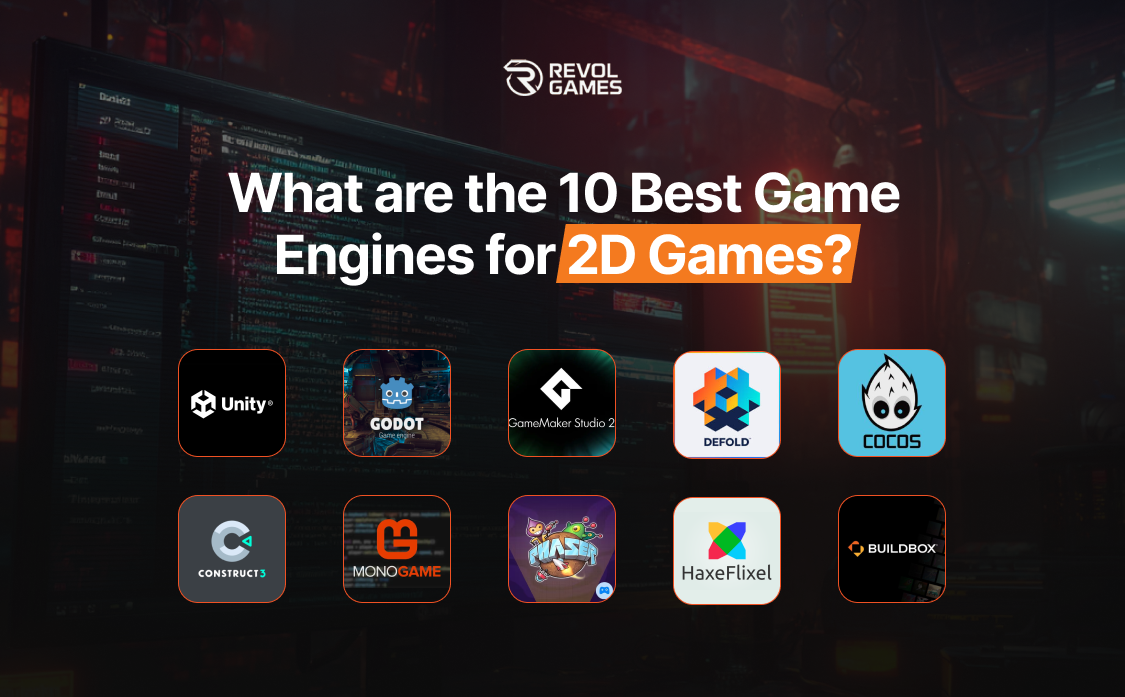
1. Unity (2D Mode)
The most popular gaming software is Unity, which is known for its flexibility and unmatched 2D support. It has an advanced 2D mode that comes with a skilled workflow for great handling and animation.
The editor is easy enough for the beginner but also has room for advanced productions, making Unity the number one choice for 2D games among game industry professionals globally.
Another great benefit of Unity is its Asset Store. Thousands of 2D art packages, character controllers, and scripts are available to production to speed up. Its C# scripting system provides depth of customization for developers who need it, yet visual tools make it accessible to beginners.
Pros:
- Huge community and vast tutorials
- Support for mobile, PC, console, and web export
- Depth of 2D lighting and animation feature
- Built-in Asset Store and plugin ecosystem
Cons:
- The system is hardware-intensive on lower-end machines
- Demands sophisticated scripting for intricate mechanics
2. Godot Engine
Godot is the most popular 2D game engine due to the fact that it is open-source, lightweight, and dynamic architecture. Its 2D rendering system is independent of its 3D counterpart, thus it performs ideally for 2D games. Visual scripting and GDScript language provide it with a friendly but powerful platform for the engine.
Developers adore Godot because of its freedom. No royalty, no licensing cost, and complete ownership of the projects. The engine continues to grow with lightning speed, with new features such as better tilemaps, enhanced physics, and more advanced lighting, making it the ideal engine to create 2D games for small studios and independent developers.
Pros:
- 100% open source and free
- Lightweight and fast for 2D game development stages
- Simple scripting with GDScript
- Ideal for indie and educational projects
Cons:
- Smaller player base than Unity
- Limited third-party integration
3. GameMaker Studio 2
One of the first 2D development pioneers, GameMaker Studio 2 is still a top 2D gaming engine for novices and experts alike. Developers can design mobile games and don’t having to do complex coding and thanks to its drag-and-drop approach. GameMaker Language (GML) provides an intuitive scripting option for enhanced control.
The engine is mostly utilized for independent hits like as Hyper Light Drifter and Undertale. GameMaker’s robust 2D engine and built-in physics allow it to be used in platformers, shooters, and puzzle games. It’s simple export to multiple platforms further makes it a favorite go-to game engine for 2D games.
Pros:
- Easy-to-use interface and rapid prototyping
- Robust 2D performance
- In-built asset management and animation tools
- Live learning materials
Cons:
- Commercial license for some export platforms
- Poor 3D support
4. Defold
Defold is a lightweight and high-performance 2D game engine built by the King (the developers of Candy Crush). Defold is highly optimized for fast development and cross-platform release, particularly for mobile and web. Defold supports Lua scripting, which is easy and efficient enough for game mechanics.
Its version control and modularity as part of its integrated system make it a perfect choice for team-based teams. The engine is performance-oriented, guaranteeing very smooth gameplay on low-spec devices. Defold is the best 2D game development tool for developers who desire the best, since it provides an ideal balance of performance, simplicity, and scalability.
Pros:
- Stunning mobile optimization
- Lightning-fast and light deployment
- Stunning for HTML5 and browser-based games
- Integrated collaboration tools for teams
Cons
- Smaller community than Unity or Godot
- Little documentation on advanced features
5. Cocos Creator (Cocos2d-x)
One of the leading 2D game engines used by mobile developers is Cocos Creator, the new replacement of Cocos2d-x. It is open-source and has scripting support in TypeScript and JavaScript. Cocos has robust rendering, an easy-to-use editor, and robust mobile optimization.
This 2D game engine has been utilized by games such as Badland and Clash of Kings. Its lightness and seamless performance appeal to the cross-platform gaming community of Asia. Its flexibility and non-royalty model have attracted developers, hence its position as a leading game engine for 2D games globally.
Pros:
- It is free to use with no royalties
- Like mobile and web development, it is perfect for them
- It supports multiple cross-language protocols
- Well-established community in Asia and on the increase globally
Cons:
- Steep learning curve for newbies
- Limited Western documentation
6. Construct 3
The world’s most compatible gaming engine software that allows you to create high-definition games in your default browser without relying on coding. Construct 3 is a drag-and-drop mechanic and visual system that helps anyone to develop games without needing experience in coding.
Construct 3 is a perfect prototyping tool that allows individuals to use for the game development process that supporting web and mobile transitions with top usability features.
Pros:
- No programming needed
- Supports all browsers
- Regular updates and a large community
- Quick prototyping and deployment
Cons:
- Very limited scripting powers
- Subscription-based model
7. MonoGame
MonoGame is open-source software based on Microsoft’s XNA, perfect for those who enjoy coding directly. It excels at being light, powerful, and phenomenal at creating professional-grade 2D games. Hit titles, including Stardew Valley, were created with MonoGame.
This 2D game engine is all about letting the developers take the reins of performance and design. It’s great for developers who wish to learn the ins and outs. For advanced programming developers, MonoGame is still one of the best game engines for 2D games that provides unparalleled freedom.
Pros:
- Open source and cross-platform
- Complete coding flexibility
- Active developer community
- Proven by commercial success stories
Cons:
- Sloping learning curve
- No visual editor is included with it
8. Phaser
A robust HTML5 game engine that is utilized for developing 2D browser games. This engine is mainly used for casual and ad or educational games, due to the fact that it is quick. Phaser is compatible with TypeScript and JavaScript, which makes it ideal for web developers who are interested in entering the gaming industry.
There are no options for download or installation for players since it works natively in browsers, and this enhances accessibility and visibility. Its plugin architecture and performance make it create amazing web 2D games, being the best engine to utilize.
Pros:
- Amazing for mobile browser games and HTML5
- Excellent at rendering
- Free and open-sourced
- High online community
Cons:
- Always needs coding capability
- Restricted to huge projects
9. HaxeFlixel
HaxeFlixel is a free, open-source Haxe-based library that provides performance and flexibility for 2D development. It has multi-platform support, ranging from desktop to HTML5 to mobile. It has a dynamic indie community. Asset management, input, and animation are simplified through HaxeFlixel.
This platform is perfect for those developers who need a balance of control and performance. Because of its open nature and cross-platform support, it is among the best game engines for 2D games that are perfect for creative developers.
Pros:
- Lightweight and open source
- Perfect for pixel art and retro games
- Great cross-platform tools
- Energetic and passionate community
Cons:
- Smaller user base
- Needs knowledge of the Haxe language
10. Buildbox
Buildbox is a no-code software that aims to be innovative and simple. It empowers designers to design entire games visually. Its minimalistic interface enables rapid game logic, physics, and asset prototyping. Buildbox is best for novices who desire to make 2D mobile games without coding.
Though restrictive for power users, Buildbox gets professional results quickly. For hobbyists and independent developers seeking the top software to make 2D games, Buildbox is an excellent choice.
Pros:
- No code needed
- Prototyping fast
- Mobile releases especially well
- Template and asset library provided
Cons:
- Subscription fee
- Less customization for advanced developers
Create Faster, Smarter, and Better 2D Games with Expert Guidance
Work with RevolGames to choose the perfect engine and tools that bring your 2D game ideas to life efficiently and creatively.
Top 2D Game Engines: Main Features
| Engine | License | Coding Required | Platforms | Ideal For | Highlight |
| Unity | Proprietary | Optional | All major platforms | Indies, professionals | Asset Store, 2D tools |
| Godot | Open source | Optional | Cross-platform | Indie devs | Lightweight, free |
| GameMaker Studio 2 | Proprietary | Optional | Cross-platform | Beginners | Drag-and-drop + GML |
| Defold | Open source | Yes (Lua) | Mobile, Web | Teams, mobile | Optimized builds |
| Cocos Creator | Open source | Yes (JS, TS) | Mobile, Web | Professionals | Strong mobile focus |
| Construct 3 | Subscription | No | Web, Mobile | Beginners | Browser-based |
| MonoGame | Open source | Yes (C#) | Cross-platform | Advanced devs | Total control |
| Phaser | Open source | Yes (JS/TS) | Web | Web devs | Fast rendering |
| HaxeFlixel | Open source | Yes (Haxe) | Cross-platform | Indie devs | Retro styling |
| Buildbox | Subscription | No | Mobile | Newcomers | No-code engine |
Why is Selecting the Correct 2D Game Engine Important For Business?
Choosing the right 2D game engine depends mainly on your budget, expertise, as well as vision. For instance, if you are a beginner, you may want to start with a no-code solution like Buildbox or Construct 3 to understand the basics. While a developer may look for efficiency and scalability, and may go after Unity.
You must consider your target platform as a high priority before choosing any engine, because every platform offers different integrated games.
Moreover, 2D game engines have a variety of efficiencies and compatibility, so you have to clearly think about your idea before you select a 2D game engine. This choice is critical as your business depends upon it.
How RevolGames Help You Create the Right Engine for Your 2D Vision
At RevolGames, we specialize in assisting developers and creative teams in choosing the ideal 2D game engine that suits their vision and business objectives. Our senior professionals with years of experience in mobile and cross-platform development know the strengths of each prominent 2D game engine.
We assist clients in defining performance requirements, platform goals, and scalability. Whether you are an individual developer looking for the optimal engine to create 2D games or an organization shipping a commercially successful game, RevolGames will guide you in the right direction.
Our company offers end-to-end assistance from engine choice and project planning to optimization and after-launch servicing. We remain up-to-date with industry trends to enable our partners to thrive with the top 2D game engines. You can count on a trusted technology partner to turn your 2D idea into a playable gem with RevolGames.
Build Your 2D Dream Game with Confidence and Creativity
From concept to launch, RevolGames provides expert guidance and the right tools to make your 2D game a success.
Frequently Asked Questions
Construct 3 and GameMaker Studio 2 suit newbies best because they are highly interactive, with the interface being graphical and the coding minimal.
In 2025, the ultimate game engine is what your project’s objectives require, but Unity and Godot are still the most universal options for amateurs and pros alike. In the event that you’re dealing with 2D games, faster development and smoother-running engines such as GameMaker Studio or Construct 3 can be used.
For 2D card games, you should utilize lightweight engines such as Godot, Construct 3, or Phaser since they’re optimized with simple mechanics and quick rendering. They also cater to quick UI creation and effortless mobile or publishing to the web.
Related Posts
How Much Does NFT Game Development Cost? A Practical Guide
- Posted by admin on February 9, 2026
- Category : Game Development
You have an NFT game concept that proves to be the next Axie Infinity or Gods Unchained? That’s exciting! But…
How Much Does Unreal Engine Game Development Cost?
- Posted by admin on January 20, 2026
- Category : Game Development
If you’re asking, “How much does Unreal Engine game development cost in 2026?”, you’re already in the right mindset. Unreal…
Top AAA Game Development Companies in 2026
- Posted by admin on January 20, 2026
- Category : Game Development
Look, the game industry is crazy at the moment. Everywhere you can find studios that say they are making the…


